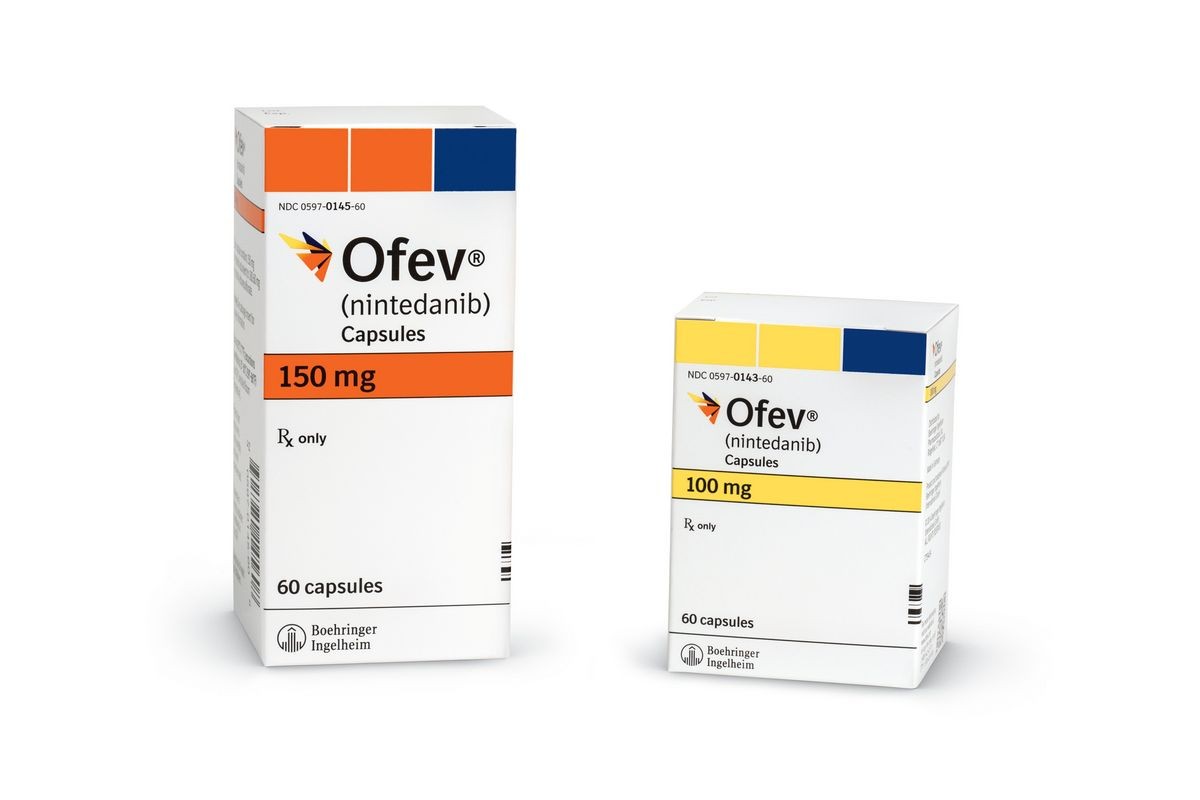
Contents
Ofev
It is not known if Ofev is safe and effective in children.
Side Effects of Ofev
Warning
Cases of proteinuria within the nephrotic range have been reported in the postmarketing period. Histological findings, when available, were consistent with glomerular microangiopathy with or without renal thrombi. Improvement in proteinuria has been observed after OFEV was discontinued; however, in some cases, residual proteinuria persisted. Consider treatment interruption in patients who develop new or worsening proteinuria.
Ofev may cause serious side effects, including:
- Liver problems. Call your doctor right away if you have unexplained symptoms such as yellowing of your skin or the white part of your eyes (jaundice), dark or brown (tea colored) urine, pain on the upper right side of your stomach area (abdomen), bleeding or bruising more easily than normal, feeling tired, or loss of appetite. Your doctor will do blood tests to check how well your liver is working before starting and during your treatment with Ofev.
- Diarrhea, nausea, and vomiting. While you are taking Ofev, your doctor may recommend that you drink fluids or take medicine to treat these side effects. Tell your doctor if you have diarrhea, nausea, or vomiting or if these symptoms do not go away or become worse. Tell your doctor if you are taking over-the-counter laxatives, stool softeners, and other medicines or dietary supplements that can cause diarrhea.
- Heart attack. Tell your doctor right away if you have symptoms of a heart problem. These symptoms may include chest pain or pressure, pain in your arms, back, neck or jaw, or shortness of breath.
- Stroke. Tell your doctor right away if you have symptoms of a stroke. These symptoms may include numbness or weakness on 1 side of your body, trouble talking, headache, or dizziness.
- Bleeding problems. Ofev may increase your chances of having bleeding problems. Tell your doctor if you have unusual bleeding, bruising, or wounds that do not heal. Tell your doctor if you are taking a blood thinner, including prescription blood thinners and over-the-counter aspirin.
- Tear in your stomach or intestinal wall (perforation). Ofev may increase your chances of having a tear in your stomach or intestinal wall. Tell your doctor if you have pain or swelling in your stomach area.
The most common side effects of Ofev are diarrhea, nausea, stomach pain, vomiting, liver problems, decreased appetite, headache, weight loss, and high blood pressure.
These are not all the possible side effects of Ofev. For more information, ask your doctor or pharmacist. Call your doctor for medical advice about side effects. You may report side effects to FDA at 1-800-FDA-1088.
Dosage for Ofev
Testing Prior to Ofev Administration
Conduct liver function tests in all patients and a pregnancy test in females of reproductive potential prior to initiating treatment with Ofev.
Recommended Dosage
- The recommended dosage of Ofev is 150 mg twice daily administered approximately 12 hours apart.
- Ofev capsules should be taken with food and swallowed whole with liquid. Ofev capsules should not be chewed or crushed because of a bitter taste. The effect of chewing or crushing of the capsule on the pharmacokinetics of nintedanib is not known.
- If a dose of Ofev is missed, the next dose should be taken at the next scheduled time. Advise the patient to not make up for a missed dose. Do not exceed the recommended maximum daily dosage of 300 mg.
- In patients with mild hepatic impairment (Child Pugh A), the recommended dosage of Ofev is 100 mg twice daily approximately 12 hours apart taken with food.
Dosage Modification Due to Adverse Reactions
- In addition to symptomatic treatment, if applicable, the management of adverse reactions of Ofev may require dose reduction or temporary interruption until the specific adverse reaction resolves to levels that allow continuation of therapy.
- Ofev treatment may be resumed at the full dosage (150 mg twice daily), or at the reduced dosage (100 mg twice daily), which subsequently may be increased to the full dosage.
- If a patient does not tolerate 100 mg twice daily, discontinue treatment with Ofev.
- Dose modifications or interruptions may be necessary for liver enzyme elevations.
- Conduct liver function tests (aspartate aminotransferase (AST), alanine aminotransferase (ALT), and bilirubin) prior to initiation of treatment with Ofev, at regular intervals during the first three months of treatment, and periodically thereafter or as clinically indicated.
- Measure liver tests promptly in patients who report symptoms that may indicate liver injury, including fatigue, anorexia, right upper abdominal discomfort, dark urine or jaundice.
- Discontinue Ofev in patients with AST or ALT greater than 3 times the upper limit of normal (ULN) with signs or symptoms of liver injury and for AST or ALT elevations greater than 5 times the upper limit of normal.
- For AST or ALT greater than 3 times to less than 5 times the ULN without signs of liver damage, interrupt treatment or reduce Ofev to 100 mg twice daily.
- Once liver enzymes have returned to baseline values, treatment with Ofev may be reintroduced at a reduced dosage (100 mg twice daily), which subsequently may be increased to the full dosage (150 mg twice daily).
In patients with mild hepatic impairment (Child Pugh A), consider treatment interruption, or discontinuation for management of adverse reactions.
Drug Interactions with Ofev
P-Glycoprotein (P-gp) And CYP3A4 Inhibitors And Inducers
- Nintedanib is a substrate of P-gp and, to a minor extent, CYP3A4.
- Coadministration with oral doses of a P-gp and CYP3A4 inhibitor, ketoconazole, increased exposure to nintedanib by 60%.
- Concomitant use of P-gp and CYP3A4 inhibitors (e.g., erythromycin) with Ofev may increase exposure to nintedanib.
- In such cases, patients should be monitored closely for tolerability of Ofev.
- Management of adverse reactions may require interruption, dose reduction, or discontinuation of therapy with Ofev.
- Coadministration with oral doses of a P-gp and CYP3A4 inducer, rifampicin, decreased exposure to nintedanib by 50%.
- Concomitant use of P-gp and CYP3A4 inducers (e.g., carbamazepine, phenytoin, and St. John’s wort) with Ofev should be avoided as these drugs may decrease exposure to nintedanib.
Anticoagulants
- Nintedanib is a VEGFR inhibitor and may increase the risk of bleeding.
- Monitor patients on full anticoagulation therapy closely for bleeding and adjust anticoagulation treatment as necessary.
Pirfenidone
- In a multiple-dose study conducted to assess the pharmacokinetic effects of concomitant treatment with nintedanib and pirfenidone, the coadministration of nintedanib with pirfenidone did not alter the exposure of either agent.
- Therefore, no dose adjustment is necessary during concomitant administration of nintedanib with pirfenidone.
Bosentan
- Coadministration of nintedanib with bosentan did not alter the pharmacokinetics of nintedanib.
Pregnancy and Breastfeeding
- Based on findings from animal studies and its mechanism of action, Ofev can cause fetal harm when administered to a pregnant woman.
- There are no data on the use of Ofev during pregnancy.
- There is no information on the presence of nintedanib in human milk, the effects on the breast-fed infant or the effects on milk production. Nintedanib and/or its metabolites are present in the milk of lactating rats.
- Ofev can cause birth defects or death to an unborn baby.
- Women should not become pregnant while taking Ofev. Women who are able to become pregnant should have a pregnancy test before starting treatment with Ofev.
- Women who are able to become pregnant should use highly effective birth control during treatment and for at least 3 months after treatment. Talk with your doctor about what birth control method is right for you during this time.
- Women using hormonal birth control should also use a barrier method of birth control (such as male condoms or spermicide).
- If you become pregnant or think you are pregnant while taking Ofev, tell your doctor right away.
Summary
Ofev is a prescription medicine used to treat people with a lung disease called idiopathic pulmonary fibrosis (IPF), to treat people with a chronic (long-lasting) interstitial lung disease, and to slow the rate of decline in lung function in people with systemic sclerosis-associated interstitial lung disease (SSc-ILD) (scleroderma-associated ILD). Serious side effects of Ofev include liver problems, diarrhea, nausea, and vomiting, heart attack, stroke, bleeding problems, and tear in your stomach or intestinal wall (perforation).


